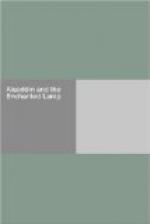The Sultan proceeded to make familiar with Alaeddin and to talk with him, and Alaeddin answered him with all courtliness and fluency, as he had been bred in kings’ palaces or as he were their constant associate; [FN#471] and the more the talk was prolonged between them, the more gladness and joy redoubled on the Sultan for that which he heard of the goodliness of Alaeddin’s answers and the sweetness of his speech. Then, when they had eaten and drunken and the tables were removed, the Sultan bade fetch the Cadis and the witnesses; so they came and knotted the knot and wrote the writ [of marriage] between Alaeddin and the Lady Bedrulbudour. Therewith Alaeddin arose and would have taken leave; but the Sultan laid hold on him and said to him, “Whither away, O my son? The bride-feast is toward and the bride present; the knot is knotted and the writ written.” “O my lord the king,” answered Alaeddin, “I would fain build the Lady Bedrulbudour a palace, besorting her rank and station, and it may not be that I should go in to her without this; but, God willing, the building shall, by the diligent endeavour of thy slave and by Thy Grace’s auspice, [FN#472] be right speedily despatched. Indeed, I long for present enjoyment of the Lady Bedrulbudour; but it behoveth me [first] apply myself to that which is incumbent on me for her service.” [FN#473] Quoth the Sultan, “O my son, look thyself out the ground which thou deemest apt to thine end and take it. All is in thy hand; [FN#474], but here before my palace is a spacious piece of ground, which meseemeth were best; so, if it please thee, build thou the palace thereon.” And Alaeddin answered him, saying, “Indeed, it is my utmost desire to be near Thy Grace.”




